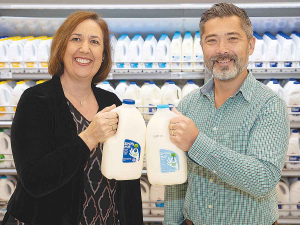Another Windfall for Fonterra Farmers, Unit Holders
Fonterra farmer shareholders and unit holders are in line for another payment in April.
 Carolyn Mortland Head of Sustainability Fonterra and Chris Anderson Merchandise Manager Chilled Beverages Foodstuffs North Island.
Carolyn Mortland Head of Sustainability Fonterra and Chris Anderson Merchandise Manager Chilled Beverages Foodstuffs North Island.
Fonterra has joined forces with a supermarket chain to deliver what it claims is NZ’s first carbon zero milk.
Simply Milk, a joint project between Fonterra and Foodstuffs North Island, hit supermarket shelves last week. It is now available in New World, Pak’n’Save and Four Squares in the North Island.
Simply Milk has been certified carbonzero through the purchase of carbon credits from Toitū Envirocare, a wholly-owned subsidiary of Manaaki Whenua – Landcare Research, a Government-owned crown research institute. The carbon credits relate to projects undertaken both in New Zealand and overseas. These have then been used to offset the carbon emissions of making the milk.
Carolyn Mortland, director global sustainability at Fonterra, says Simply Milk is a good example of how co-op’s strategy is putting sustainability at the heart of everything it does.
“With Simply Milk we have a practical way to demonstrate their support for the environment,” she claims
“It will enable us to support the regeneration of 7.5 square kilometres of native forest near Kaikoura, as well as renewable energy programmes in overseas markets where Fonterra sells its products.”
Foodstuff’s Chris Anderson says it’s becoming increasingly important to customers to know where their food comes from and that it’s being produced sustainably.
“It’s really exciting to be bringing this first to New Zealand. Simply Milk offers customers the opportunity to purchase their everyday milk and know their choice is making a difference to something that’s really important to them,” says Anderson.
Toitū Envirocare chief executive Becky Lloyd says the carbonzero accreditation process firstly evaluates the carbon emissions of making the milk, right from the farm via store fridge to the customer’s home. The product’s footprint includes farming, production, distribution – as well as eventual consumption and disposal.
Fonterra and Foodstuffs North Island then worked with Toitū to identify projects to offset the emissions.
“We apply a thorough set of principles to determine if a given carbon credit project is real, reliable and meets our quality standards,” says Lloyd.
“Reaching net zero by 2050 requires all New Zealand businesses to start measuring and reducing their emissions now.”
The Meat Industry Association of New Zealand (MIA) today announced that Chief Executive Officer Sirma Karapeeva has resigned from the role.
The winners of the 2026 Hawke’s Bay/Wairarapa Dairy Industry Awards were announced at the annual awards dinner held at Copthorne Solway Park in Masterton on Thursday evening.
Environment Southland is welcoming this week’s decision by the Environmental Protection Authority (EPA) to approve the release of Blaptea elguetai, a leaf‑feeding beetle that will help control the highly invasive Chilean flame creeper.
This March, the potato industry is proudly celebrating International Women’s Day on 8 March alongside the International Year of the Woman Farmer, recognising the vital role women play across every part of the sector — from paddocks and packhouses to research, leadership, and innovation.
Fruit trader Seeka posted a record profit and returns to shareholders in 2025.
Recent weather events in the Bay of Plenty, Gisborne/Tairawhiti, and Canterbury have been declared a medium-scale adverse event.
OPINION: Staying with politics, with less than nine months to go before the general elections, there’s confusion in the Labour…
OPINION: Winston Peters' tirade against the free trade deal stitched with India may not be all political posturing by the…